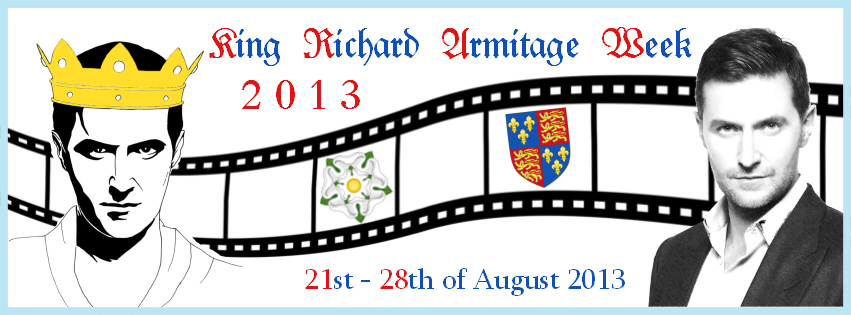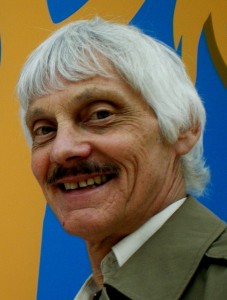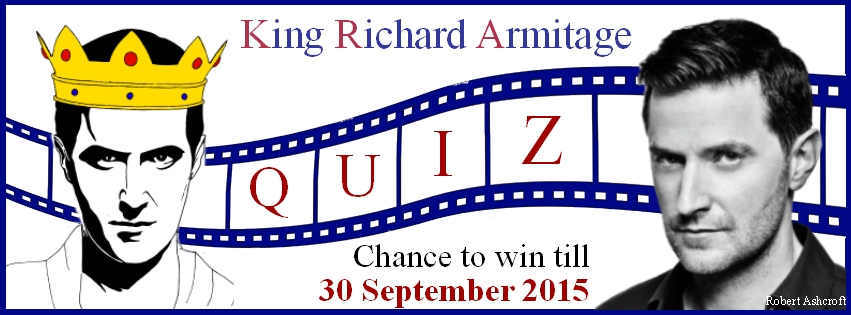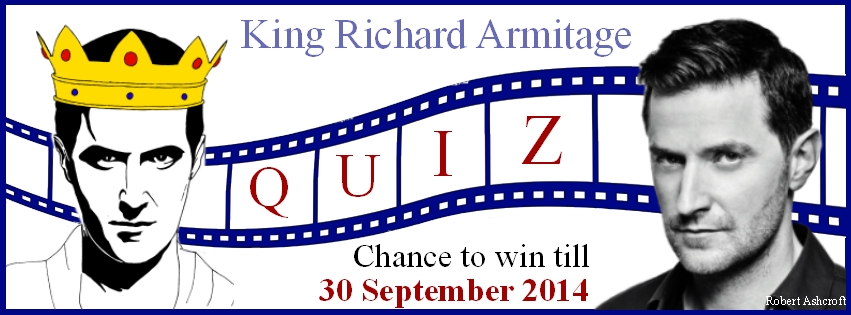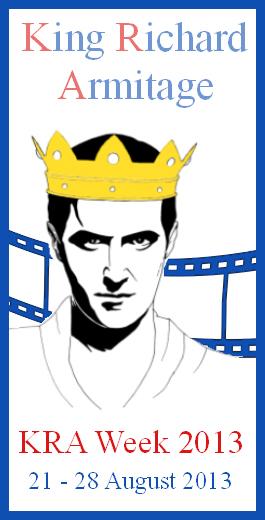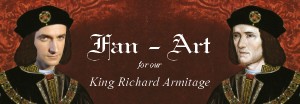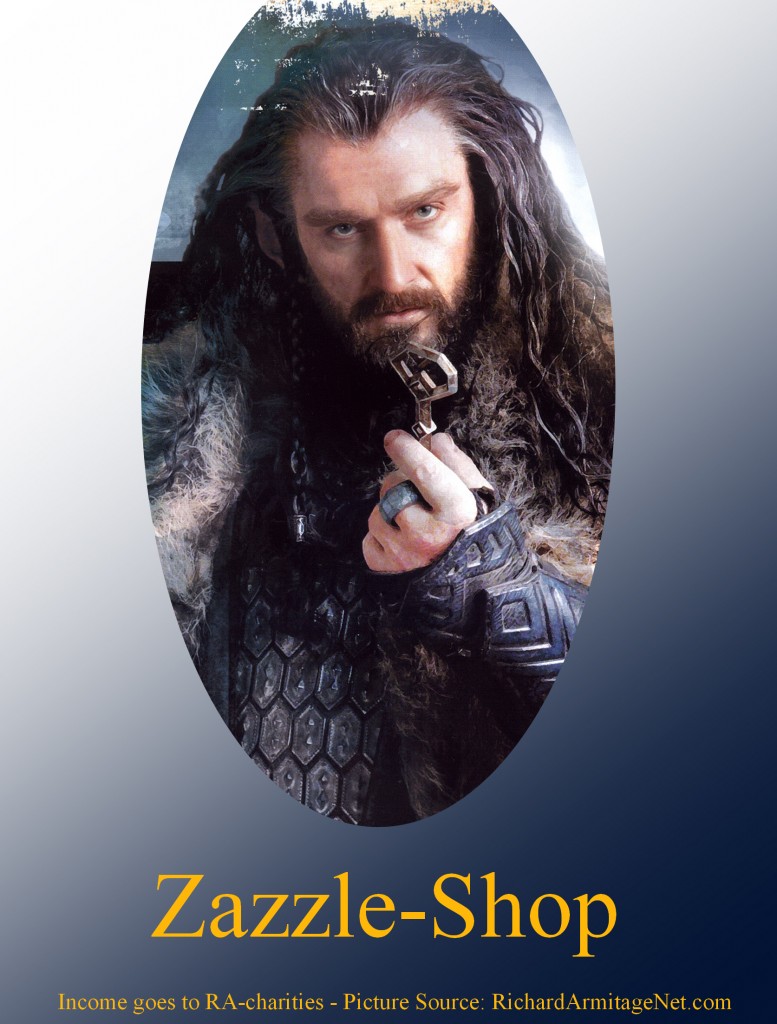Richard III – Event on April 9th, 2022
After the long pause in posting, it is an especial pleasure to announce an event that includes two Richard III-experts we have already interviewed here on the KRA-website.
In the New South Wales-branch of the Richard III Society in Australia, Isolde Martyn will moderate the bookclub-discussion with Matthew Lewis about his book “Richard III. Loyalty Binds Me”. He has various well known publications about King Richard III we linked to here on KRA already. He also showed his expertise with his knowledgeable answers in our interview from the year 2013, “History & Law – Author Matthew Lewis” (August 23, 2013). Since then, he became head / Chair of the Richard III Society.
- Interview for Plantagenet Society of Australia (26.08.2011)
- Interview about author Isolde Martyn (14.03.2013)
- Book about Jane Shore “Mistress to the Crown” (2/2013)
- Book “The Devil in Ermine” (2013) – King Richard III in the year 1483, from the perspective of his cousin, the Duke of Buckingham.
- History & Law – Interview (23.08.2013)
- Book about King Richard III “Loyalty Binds Me“
- Podcast-Series (iTunes)
The bookclub-event will take place on Saturday, 9th of April 2022, and is held online via Zoom. They still have some places left to join in, even if you are not member of the NSW- RIII Society. So please check for your local time, if you want to take part.
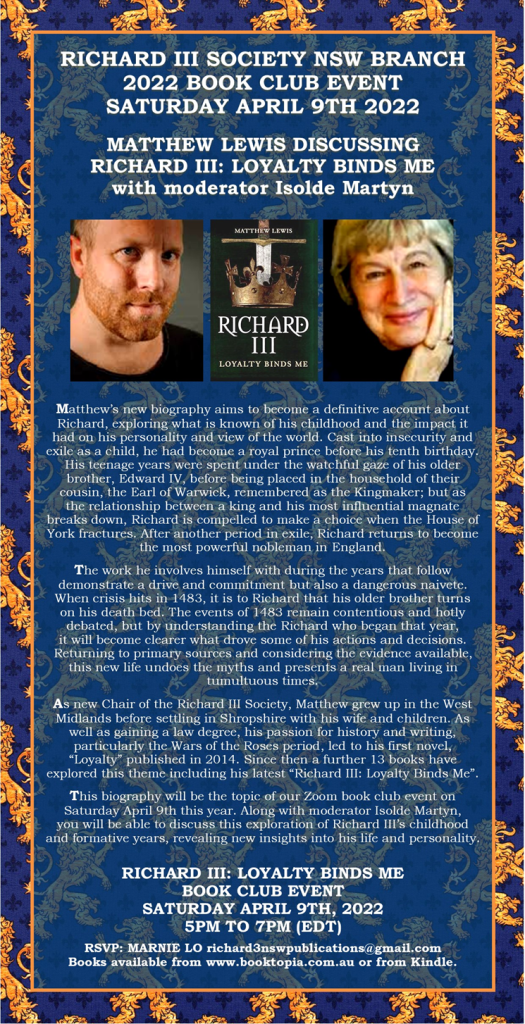
Please reserve your spot via e-mail to Ms. Marnie Lo (e-mail in image – and not repeated here to avoid spam.)
Local times, e.g.
- Auckland, N.Z. 7 – 9 p.m.
- New York, U.S.A. / Ottawa, Canada 3 – 5 a.m.
- London / Belfast 8 – 10 a.m.
- Paris, France / Berlin, Germany 9 – 11 a.m.
I am very much looking forward to the event!
All the best to you and stay healthy and safe !
Richard III on Mr. Armitage’s Bucket List
Richard Armitage was interviewed by The Broadway Channel – “Love, Love, Love’s Richard Armitage on Dancing Like a Teenager Backstage, His Royal Bucket List Role & More” (01.12.2016) about his role as Kenneth in the play “Love, Love, Love”.
Part relevant for King Richard III, transcribed from the video accompanying the interview article:
What role is on your acting bucket list?
Yeah, there is a role on my bucket list. It has been there for a long time, actually. I’d like to play Richard III in some context, whether that’s the Shakespearean version or another version. I was born on the day that he died and I was named after him, so I feel like I have to […] get into his head, or something.
Video by: The Broadway Channel, 01.12.2016
Produced by: Lisa Spychala
Photographer: Emilio Madrid-Kuser
Shot & Edited: Nick Shakra
Graphics: Tony Mendoza
Richard Armitage about the King
Richard Armitage mentions King Richard III and a new Channel 4 documentary about the king, coming out next year, in the new interview:
Sunday Times interview with Richard Armitage by Ed Potton (28.11.2014)
(Quote from the RichardArmitageUS-FacebookPage.)
[…] He’s [Richard Armitage] always been drawn to conflicted roles: Oakenshield, Proctor, Lucas North, his double (triple?) agent in Spooks. “I know,” he smiles. “I need to do some comedy, don’t I?” He doesn’t mean it, though: he knows he’s best at playing men who combine light and shade. That may go back again to Richard III, with whom he inherited an obsession from his father. Armitage was set to be called Russell until he was born on the anniversary of Richard’s death at the Battle of Bosworth. His dad took that as a sign: he was instead named Richard.
When the King’s remains were recently discovered under a car park in Leicester, down the road from where Armitage grew up, he was thrilled. He hopes to be involved in a documentary about it for Channel 4 next year. How about playing him? He’s not hopeful: “He was a young man when he died.” Don’t believe that one, either: Armitage could make a splendid crookback. Imagine the mixtape for that one. […]
Richard Armitage – TheOneRing.net – The End of a King
TheOneRing.net – Interview by Greendragon
Interviewed by GreenDragon for TheOneRing.net (14.04.2014) about his role as Thorin Oakenshield in Sir Peter Jacksons record breaking production “The Hobbit”, Richard Armitage mentions King Richard III again.
As glad as I am that even for Tolkien fans King Richard III is worth a question, I must admit, I wonder if the late battles around King Richard III brought this change and caused this very distancing statement about Mr. Armitage’s interest in telling the (hi)story of King Richard III.
GreenDragon: One last thing I’m interested to ask you about – I keep reading about your fascination with Richard III, and that you have interest in making a film about him. I just wondered what truth there is in any of that?
It was an idea that I had a while back. But my interest in it is really a hobby, of reading biographies, and I was once working with a script writer on something. I don’t know whether a documentary would be of interest… it’s difficult, finding something which is going to be commercially interesting, and for an audience – I don’t know how many people would be that excited about him… My interest in him doesn’t necessarily have to manifest itself in a piece of work. Even if it’s me going back on stage and playing him; it’s purely a hobby for me.
GreenDragon: It’s a fascinating topic – particularly when you consider how Shakespeare has painted him into one particular corner…
Yeah, I mean Shakespeare really created a bit of a pantomime and put him at the centre of it. It’s a brilliant thriller, but I don’t know how biased Shakespeare was… Well, I do know how biased he was, because he was writing for a Tudor monarch! But I think there’s a tale to tell. I think the BBC maybe are investigating doing a project about Richard, but we’ll see. I think there’s always room for a new take on it; and there’s plenty of literature out there. The Daughter of Time [Josephine Tey] is such an interesting book, and that would be worth exploring.
King Richard & Mr. Armitage & Cheese
Richard Armitage is currently filming in Leeds, U.K., and was interviewed by Geeta Pendse from BBC East Midlands Today (02.04.2014), where he once again mentioned his connection to and interest in King Richard III.
The video of the interview is available on Facebook (no Facebook account necessary to watch the interview).
Perhaps, I should not introduce the interview so neutrally here.
After all, Mr. Armitage is announced in the comment to the video on Facebook as:
“Gorgeous Hollywood hearthrob“.
The transcript of the interview part about King Richard III follows here:
BBC East Midlands Today – Interview with actor Richard Armitage by Geeta Pendse
Geeta Pendse: Obviously, your name is Richard, and there is someone very famous that is called Richard, … who was recently discovered in Leicester.
Richard Madeley, I know, that is amazing, isn’t it?
[British readers perhaps will be able to verify the name of the celebrity, Mr. Armitage mentions here in his comment. I just guessed and googled…]
Geeta Pendse: Also Richard III. Are you named after Richard III?
I was born on the 22nd of August and that was when he died on the battlefield at Bosworth. That is one of those history questions that I always got right. But my dad was really into Richard III, so he chose that name. I think if I hadn’t been born on the 22nd of August, I might have been called Russell.
Geeta Pendse: Do you know, I am born on the 22nd of August and I am not called Richard.
And you are not called Richard.
Geeta Pendse: What happened? Maybe it was this whole girl thing.
I don’t know. We could think of another name for you. – Elizabeth.
Geeta Pendse: Yeah. And were you aware of this whole story unraveling in Leicester?
I was in New Zealand at the time, so I was receiving the news sort of sporadically. But yeah. I am kind of fascinated and thrilled that they found him and have laid him to rest or whether that’s still up in the air as to where he is going to be laid to rest. But yeah. I still haven’t had chance to visit the site yet, but I will.
Geeta Pendse: And do you ever visit Leicester?
I do, especially, I am working in the U.K. at the moment, I am working up in Leeds. I have visited Leicester quite a few times, but mainly to the country side. I haven’t been into the city center for a while.
Geeta Pendse: So, if I could bring you one thing from Leicestershire […]
Pork pie and a piece of Stilton.
Geeta Pendse: You are on. We will do that.
Deal.
I must admit, a man who loves cheese has won my sympathies forever. I am currently on a discovery tour to all the varieties of English cheese, so the end of the following interview was an especial highlight for me.
But now follows my first embedding of a Facebook post. So I hope it works…
Richard Armitage Asked About King Richard III
The Anglophile Channel, U.S.A. revealed that
due to the results of their poll with participation worldwide, Richard Armitage is the
“Favourite British Artist of the Year 2013”.
In combination with giving Richard Armitage his well deserved price trophy, Marlise Boland interviewed him and asked the for us central question what Richard Armitage intends to do about King Richard III:
Marlise Boland: Is it true you were named after Richard III?
RA: It is true. Yes. I was born on the 22nd of August …
Marlise Boland: The day of his demise.
RA: Right. At the Battle of Bosworth.
Marlise Boland: So you do have affinity to that historical character.
Do you want to play him on stage or do you want to have a film project made out of his story?
RA: He is never really far from my head when it comes to assembling some kind of visual documentation of his life. […] I think he deserves a cinematic outing, that story.
I think it is an extraordinary tale. I think the Wars of the Roses is extraordinary. The last […] English monarch to die on the battlefield – in combat – and actually, a noble death.
A misinterpreted character, I think. But that is the reason to go exploring, because we don’t really know. […]
I don’t know whether I’ll get to play him in a movie, but I’ll certainly have a crack at him on stage.
Marlise Boland: Would you write the script? Have you written a script?
RA: I am not much of a writer. I am good at adapting other people’s writing.
But, yea. The assembling of ideas and gathering people together on a table is something that is my longterm goal over the next 30 years.
I’ll probably be acting less and producing more.
(The interview “Richard Armitage Interview Part 3: Richard the Third! with Marlis Boland (09.03.2014)” with Richard Armitage was released in three parts on YouTube. Here in the third part the question about King Richard III starts at about 3:10.)
The Anglophile Channel, U.S.A. (future website)
KRA-Week 2013: Thank You
! Congratulations !
to our KingRichardArmitage Champions
We have the winners of this year’s quiz!
The quiz remains open so that you can further try your knowledge,
but the book prizes will go to:
Fabi & Kathryn Barnes
To my great surprise, it was a point decision and not by random number selected from all the correct answers.
And I had thought, I had made the quiz much too easy.
Sorry! Solutions are available here now.
Quiz prizes are: Two books by
Isolde Martyn “The Devil in Ermine”
♛
Thank You !!!
to all interview partners
- Authors Isolde Martyn & Matthew Lewis – for their wonderful novels about King Richard III,
- Peter Warzynski – for his insights into archaeology and sharing first-hand Leicester experience with us,
- Fitzg – for her insights into King Richard III’s clothes,
- Jim Cowan – for exploring King Richard’s Wales,
- Dr. Ashdown-Hill – for enabling the find of King Richard III, and
- MaryAnn & Michael Tedstone – for bringing King Richard III back to life in music,
and all our helpers and contributors
of the King Richard Armitage Week 2013.
It was a fantastic experience for me
and I hope you enjoyed the celebrations!
KRA-Week 2013-8: Historical Music – The Orpheus Project
Links: King Richard Week 2013 & Quiz
! Attention !
The winners of the quiz are final and will be announced in a separate post today, where also the link to the quiz solutions will be revealed.
♕ ♛ ♕
King Richard III & Music
An interview with MaryAnn & Michael Tedstone
The Orpheus Project
Peter Warzynski in his interview (25.08.2013) gave us so insightful background information about Leicester and the euphoria about finding King Richard III there.
What better method is there to express happiness and joy than in music?
So I am very happy to present a Leicester based team of composers, MaryAnn & Michael Tedstone, with their group
The Orpheus Project
The two composers, MaryAnn & Michael Tedstone, brother and sister, are famous for their film music and their successful effort to combine old traditions with new musical elements.
They embrace the history and time of King Richard III and present musical elements and lyrics he might have known or heard himself in their new recording:
“The Last Plantagenet”
To tease you a bit with the wonderful music, here is a sample of “The Last Plantagenet”.
And I can assure you, it is worth having a look around the websites of the composer team, as their diverse music really is a joy and has a wide bandwidth of styles. I already spent quite a while on their websites and listened to their wonderful music:
- www.orpheusproject.co.uk
- www.manikemusic.com
- The Orpheus Project on SoundCloud
- ManikeMusic on SoundCloud
But now, I let them tell you themselves about their music and creative ideas behind “The Last Plantagenet”:
♛
How did the group “The Orpheus Project” come into existence and when?
The Orpheus Project came into existence in 2011, when we recorded an Album of Ancient Greco Roman music. We wanted to create an ensemble made up of musicians who are experts in their fields but do not have traditional early music training. I think that early music can be over stylised and I wanted the music to have a natural feel. I felt that by making a new ensemble and having a new look at how music is written and created, we could provide a refreshingly new sound to different periods of music.
Who composes / arranges / selects music / chooses, researches and finds texts / trains the group / records the music?
MaryAnn does most of the composition/arranging music selection and trains the group.
Michael records and produces the music. One of the things that makes The Orpheus Project unique is that we have our own industry standard studio. we are used to writing music and recording it for projects all over the world so it’s easy for us to make albums. We don’t have to worry about studio time and finding a good producer. We have one of the best music producers right here with us.
What is the background of your group and your individual musicians?
MaryAnn Tedstone studied Early music at the Guildhall School of Music and Drama with Philip Pickett.
Michael Tedstone studied music production at Alchemea College of music.
Glenn Sharp is a world music musician who play with the Jadid ensemble and is signed to Universal Music.
We use a variety of other musicians and vocalists who are experts in their fields. Each period calls for different instruments so it’s hard to give further information
Are your musicians only perform in this group or also individually or in other groups or ensembles?
Our musicians regularly play in other ensembles. Its what keeps us fresh and excited about what we do.
Why was this name chosen for the group? What connection does your group have to the Greek mythology?
When Orpheus called to his father Apollo, he did so on a golden lyre. I have always wondered what the music was that called the God Apollo down to Earth to help his son Orpheus. The Orpheus Project seemed like a good name. Our first Album was of Greco Roman music too. It also combines old and new which is what The Orpheus Project is all about.
Is your group mainly doing recordings or performing life?
The group does both live recordings and performs live.
Our next performance is for Leicester City Council where we are playing at a banquet.
I saw in the information, that you Ms Tedstone, are mainly composing film music and soundtracks for movie and film productions and advertisements. Is this also the direction of “The Orpheus Project” or to what purpose was this group created?
The Orpheus Project was intended to write music for historic documentaries and tv programmes but has become so much more due to the level of interest that we have received.
Why the title “The Last Plantagenet” for your CD? It gives already an interpretation of the events surrounding King Richard III’s demise in the Battle of Bosworth as well as the legitimacy of his royal succession. Is that intended or a reference to the last Plantagenet King on the throne of England or not an exact reference to King Richard III at all?
The album the Last Plantagenet is a reference to King Richard III. This album is music that he either might have heard, or music that has been specially composed in the style of the period.
What connection does the music have with King Richard III and are the music pieces new arrangements of old music or new arrangements ‘in-the-style-of’?
The Orpheus Project albums are intended to be a soundscape of what someone living in the period might have heard. For example our album SPQR is a representation of what Nero might have listened to.
Where do the texts / lyrics come from? E.g. the French text of the piece “Douce Dame”.
The Texts are all original. There are two by Dufay and One from Machaut.
If they are historic texts, would they be something Richard III could have had access to?
Yes we think King Richard III might have heard Douce Dame.
What image of King Richard III does the music promote?
(e.g. Richard III as courtier, as religious person of his time, as entertainment and music loving noble of his time,…)
I hope that the music makes you think that if King Richard III was riding through the streets of Leicester he might have heard something like our music playing in the street or in a pub.
What is your / your group’s connection to King Richard III?
We became interested in King Richard III when his body was found in a car park in Leicester and we started researching the music straight away.
What determined your choice of instruments in your group?
Not every travelling troupe of musicians would have had every instrument available to them. I felt that the lute and the hurdy gurdy were expensive instruments and so we should have only one. We chose lute. We have thought about what would happen to instruments when musicians of the period slept in fields or woods in between towns and we think that would have been really bad for all the instruments. Hopefully they put them in wooden cases.
Will your group get any official involvement in the ceremonies around King Richard III’s reburial next year?
We are officially involved with Leicester council. They are selling our CD in the museum and promoting us as much as they can. The re-burial is a church event and I have no idea at this stage how much involvement we will have.
What are your / your groups next plans for recordings? Is there more in store for all Richard III and late 15th century music fans?
We are thinking of looking at Robin Hood next which is not too far away from King Richard III. Stay tuned on our website www.orpheusproject.co.uk for more details.
Now that is good news for all Richard Armitage fans. Hopefully Sir Guy of Gisborne gets an extra place and special representation in the new music-project.
We will also keep you informed when the music of “The Last Plantagenet” will become available on iTunes in September 2013.
So far, you can order the CD version – £ 9,99 (PayPal payments accepted) – via alex@manikemusic.com.
(Please get in contact for delivery rates, though they are very decent and partially free of charge and the CD is sent out worldwide.)
Links: King Richard Week 2013 & Quiz
KRA-Week 2013-7: Finding Richard III as a Result of Historical Research – Dr. Ashdown-Hill
Links: King Richard Week 2013 & Quiz
! Attention !
Last day of quiz-entries taking part in the drawing!
(Today till midnight [GMT] !)
Quiz prizes are: Two books by
Isolde Martyn “The Devil in Ermine”
♕ ♛ ♕
History’s new potential
in the discoveries of Dr. John Ashdown-Hill
Why a special article about Historian Dr. Ashdown-Hill here, during the KRA week, when we already had interviews and present his research work here on the website?
- Dr. John Ashdown-Hill talks about his research regarding King Richard III
- Started KRA-page about Dr. Ashdown-Hill’s research. (With recommended video presentation of research steps.)
- Information about Dr. John Ashdown-Hill and his publications.
And other articles already covered the topic of ‘airbrushing’ Dr. Ashdown-Hill out of the story of finding King Richard III:
- Richard III: Historian claims he was ‘airbrushed out of king story’ (by Peter Warzynski, Leicester Mercury, 06.08.2013)
- Leicester ‘airbrushed’ historian out of Richard III find (by Paul Jump, Times Higher Education, 01.08.2013)
There was something I needed to figure out and I want to present some of my thoughts and results to you here.
Dr. Ashdown-Hill is an open-minded researcher, who searched for facts, where others readily followed legend – over centuries.
As the dissection of legend in the case of King Richard III was so very important, to even allow the beginning of the search, I cannot readily understand, why the one man, doing all the work mostly singlehandedly, strongly believing in the validity of his finds, does not get the praise he deserves.
It required already great effort together with Philippa Langley, to even raise sufficient doubt with researchers and officials in Leicester, to get their agreement to do a paid contracted search and give all the required permissions for the digging.
(And here a big motive for the specialists was that they could at least find other historically significant material for Leicester, to make it worth their while, which in the end caused their agreement to start digging.)
But why chose exactly this location for the digging, when the supposed location, indicated by a plaque, was so far away from it?
That was the result of a meticulous research of maps and sources about Leicester – done by Dr. John Ashdown-Hill.
He recognized, that some newer maps were inaccurate (the street drawn at the wrong side of the Greyfriars’ church, according to written sources of contemporaries) and the old medieval streets must have been located a bit differently from what reconstructions of historical Leicester so far made believe.
This changed the location and the area of research entirely and was based on the research of Dr. John Ashdown-Hill.
So, why is there no mention of this fact?
You would think, after all this research so essential for finding King Richard III, there should be a hall of fame for Dr. Ashdown-Hill.
Perhaps next year’s opening of the King Richard Museum in Leicester will remedy that fact and will give praise where praise so clearly is deserved.
We at the KRA website already started our small contribution to a ‘hall of fame’ here and hope to be able to contribute to set things straight.
One aspect, which especially fascinates me in the work of Dr. Ashdown-Hill, is his research, remaining unbiased by the ‘mainstream’ line of previous historical research and starting to get to the fact beneath layers of wrong and long traded interpretation.
This is a fact which exceedingly makes me happy about the research of Dr. John Ashdown-Hill and the finding of King Richard III.
It gives me hope for the art of history in its entirety, that with new perspectives and openness, history with its extensive tools and methods is able to discover great things about the past in the future.
History loses its dust cover and the strictures and rules by some self announced dictators and starts to get truly ‘researchable’ again.
So the real questions about King Richard III for me are not
will he be buried in York or Leicester or …,
was he a good or bad king,
was he a saint or murderer,
but that finding him was able to break up traditional perceptions of a story and a new approach was found and the truth behind it was revealed, after over 500 years!
This fact alone makes me absolutely jubilant!
History is no static entity any longer, but a playground opened up for new research. (While ‘playground’ not in the slightest means this is an easy task, but what history always has been, hard work and an enormous accumulation of knowledge of all kind.)
So go and search and keep your mind open for any possible result!!!
I hope to find out much more about the developments and events leading to the archaeological research in Leicester in the new book by Philippa Langley announced for the end of October 2013:
.
And Dr. John Ashdown-Hill publishes his new research about royal marriage traditions and currently works on a new book about Richard III’s third brother, George, Duke of Clarence:
.
Kindle version:
.
Links: King Richard Week 2013 & Quiz
KRA-Week 2013-4: Peter Warzynski & Leicester
Links: King Richard Week 2013 & Quiz
♕ ♛ ♕
Interview with journalist Peter Warzynski
about
Leicester & Archaeology & King Richard III
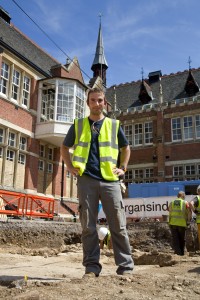
Peter Warzynski, Leicester Mercury – at the digging site where King Richard III was found. 7/2013 (Source: Peter Warzynski)
After yesterday’s interview with author Matthew Lewis, today we have an interview with journalist
Peter Warzynski from Leicester.
For all who follow the news about King Richard III here, he will not be a stranger.
Peter Warzynski is the knowledgeable reporter with the reliable news and information about Leicester and everything King Richard III. If the general news reports are vague about a topic, go find his article on the matter and you will certainly find the background and information you are searching for.
So I was very curious when Peter Warzynski wrote about his first hand experiences during the second digging at the location of the Greyfriars’ Church in Leicester in July 2013, and – surely not a daily occurrence for a journalist – I asked him for an interview, which he kindly granted.
The article in the Leicester Mercury with a fantastic picture of the digging area and his exact spot of research:
Leicester Mercury: Richard III dig: The hidden secrets of historic friary (20.07.2013)
And the description of his experiences during the archaeological research:
Leicester Mercury: Richard III dig: My brush with urban archaeology (22.07.2013)
With Peter Warzynski, I hardly could stop myself asking him questions. He is so knowledgeable about Leicester, has first hand experience about the digging, the location and the town.
Now, I hope you will enjoy the interview as much as I did while getting all my curious questions answered:
♛
Can you tell us a bit about yourself, your background as a journalist and your connection to Leicester?
I was born in Leicester, in the city, just a few miles from the car park where they found the remains of Richard III.
I’ve been a journalist for about eight years, starting at BBC Radio Leicester and moving to the Leicester Mercury about five years ago. I now live in Wigston, about five-miles outside of the city centre.
What is your impression about how the people of Leicester feel about the discovery and King Richard III himself?
I haven’t heard anything negative about the discovery from people in Leicester. Everyone is over-the-moon that we have a king buried in our city… and they’re even more excited about the fact that he will be reinterred at the Cathedral next year. Hopefully. The legal battle for the remains could push things back, but if the High Court sees sense it will make its decision quickly and the reburial can go ahead as planned.
The influence of Richard III in Leicester and Leicestershire is huge. We have the annual Battle of Bosworth re-enactment, we have roads, towns, schools and places named after him. We have statues, monuments and plaques dedicated to him. And we are in the process of building a museum in his honour.
How is the influx of visitors generally seen for / in the town?
Tourism is not our greatest industry, but we do fairly well.
Saying that, since the discovery of Richard III, it has boomed – and you can see that people are jumping on the bandwagon and using the king to promote their shops.
Advertising for local businesses suddenly has a Richard III theme and tour operators are offering packages to holiday makers which include all of the Richard III related sites.
More than 100,000 people have visited a small, temporary exhibition at the Leicester Guildhall, in the last few months. They have travelled from America, Australia, Asia in their droves and queued for hours to see the humble exhibition.
Next year a £4m permanent visitor centre will open, which will feature the grave of Richard III and is expected to attract millions of tourists.
It remains to be seen how long the initial explosion of excitement will last, but judging on how well people have taken to it, I think it’ll be a sound investment.
It had always been clear that King Richard III had been buried in Leicester after the Battle of Bosworth, but what does the knowledge that he indeed is there and finally found change for Leicester?
I don’t think it has always been clear. There was evidence to suggest he was buried by the Grey Friars, but where exactly that was has been a mystery for years.
Granted there was evidence to show that he was at the friary, but then again there was conflicting accounts to say he was elsewhere.
One of the main changes, now we know we have his bones, is the way Richard’s story is taught in school. Until the bones were identified, people still argued that his remains were dug up at some point in the past and thrown into the River Soar. That myth has now been quashed.
There is still quite a bitter debate over who identified the real location of the grave since the Greyfriars dig.
John Ashdown-Hill, who tracked down Michael Ibsen – Richard III’s 16th great grandnephew – claims he pinpointed the grave first.
However, the University of Leicester says that one their own – a lovely chap named David Baldwin – was the first person to positively identify the final resting place of the Plantagenet monarch.
Were you interested in King Richard III and his story before the digging in Leicester began?
Everyone in Leicester knows about the story of Richard III because he has had such a big influence on the city and the county.
As I mentioned before, the Battle of Bosworth is re-enacted every year. (In fact, this year, a German (Bavarian) man by the name of Andreas Wenzel will play the role of Richard at the anniversary re-enactment.)
So all Leicestershire folk have an interest in the former King – everyone I know has read Shakespeare’s imagining of him at school at some point.
I have an interest in history anyway, so this is very much up my alley (so to speak), and I the fact that history is playing itself out on my doorstep is fantastic. I also hope it will inspire others to become interested in history too.
King Richard III, though dead for over 500 years by now, still awakens great emotions, varying from hatred to support and loyalty. What do you think might be the reason for this heated debate about him, when other royals or historical figures can expect a more ‘neutral’ research into their life after such a long time?
Richard has polarised people for hundreds of years because nobody really knows what he was like. Or at least nobody knows the complete truth. There have been so many conflicting accounts written about him, it is impossible to determine what the man was truly like.
Did he murder the Princes in the Tower? Did he die bravely in the thickest press of his enemies? There’s nothing to sat he did both – or neither. This is the problem with trying to establish his character.
I believe that Richard ruled and acted like a typical medieval monarch. As far as people of the time were concerned, he was a conventional king.
I think that because very little is known about him, and due to a war of slander and deformation with Henry VII, what people think they know is shrouded in uncertainty – and it is very easy people to pick and choose what they believe and discount the pieces of history that don’t fit with their image of him.
The problem with my point-of-view of Richard is that by sitting on the fence I manage to alienate both the supporters and detractors with my boring uncommitted open-mindedness.
What did King Richard III and discovering his remains in Leicester change in your life?
Has your attitude / awareness for Richard III in your town (city) changed since the beginning of the digging? Was the digging you could join able to change your perception / perspective?
The discovery has changed the way I view archaeology.
I worked with the University of Leicester dig team on the second Greyfriars excavation, which finished a few weeks ago. It was at the same site and the grave of Richard was still visible – but this time the team was looking for more information about the friary itself.
The experience was like a roller coaster – one minute I was laboriously brushing the dust from the 50th broken tile I had found, daydreaming about what I was going to have for dinner that night. The next I was lifting the lid from a 600-year-old stone coffin to reveal what everybody thought would be a medieval knight, or the founder of the friary. I say ‘thought’, because what we actually found was a second lead coffin inside the stone tomb – a surprise for everybody, even experienced site director, Mat Morris – who found Richard a year ago.
After taking part in the dig, I realised just how unbelievably unfathomable it had been that the team had stumbled upon Richard’s grave the way they did.
When I spoke to Richard Buckley – who led the project – on the first day of the original Greyfriars dig in August 2012, he said he would eat his hat if they found anything. He was convinced the best the team would do is find part of the medieval friary – maybe the church.
So it goes to show how unexpected the find was.
Were you interested in archaeology before King Richard III was searched and found? If yes, why and how did you get information, what interested you?
What interests you now, after you have experienced a digging yourself?
I was interested in archaeology the same way most people are interested. I like books and documentaries about Egyptian tombs and Mayan ruins – not city centre digs.
Now, however, I think there’s something to be said for urban archaeology.
Since the discovery of Richard III, I have written a few more stories for the newspaper about other digs in Leicester – not connected with the Greyfriars – and I’ve learned a lot about the history of the city – who founded it, how the first settlers lived, when the Romans moved in, when the Romans moved out and how Leicester grew.
Digging so close where King Richard III was found, what aspect was more important to you. To get more knowledge about archaeology in general, about the history of your town or possibly about a famous king, who had gone missing some hundred years past?
I think all three tie in together. The more I found out about archaeology through working with the team, interviewing the archaeologists and reading about the project, the more I understood how amazing the story of Richard III was.
The University of Leicester maths department calculated that the odds of finding the remains was less than one per cent.
When you learn that only 17 per cent of the friary is not buried beneath buildings, walls or roads – that in itself is amazing.
If Richard had been interred anywhere else in the remain 83 per cent of the friary – which is unreachable – he would never have been found.
How important was the factor of good weather for your digging? What influence did it have on your results and speed of your digging?
It didn’t really have that much of an impact. The sun dried out the earth which made it difficult to photograph and catalogue because of the dust – it settled everywhere and made the whole place one uniform colour. It meant that details on stonework and tiles were indistinguishable from other nondescript areas. So before every photo was taken the whole site had to be hosed down and watered to bring out the detail and colour of the archaeology.
What methods did you see and were allowed to do yourself during the dig?
The dig process was mostly a meticulous one. First the heavy machines come in and remove the Tarmac and top soil. Then the archaeologists take over once they feel they’re close to the archaeology. My role involved using mattock – a type of pick – to carefully remove layers of soil and then once I’d come across something of interest – which mainly turned out to be medieval floor tiles – I would use a trowel and brush.
However, like I mentioned before I was also there when the stone coffin of Sir William de Moton (although it could be a number of other likely candidates) was unearthed, which was very exciting.
When we removed the stone lid, everyone expected to see a skeleton. But what we found was a second lead coffin inside, which is now at the university undergoing analysis.
In what aspects was archaeology more difficult and harder or easier than you expected?
Did the archaeological research and the used methods meet your expectations?
There’s a lot of manual labour involved. Shifting large wheelbarrows full of soil and debris from the excavation site.
One minute you’re heaving big clumps of dirt from the earth, and the next your being very careful because you’ve found ‘something’ which might be very interesting – and you have to change tact and be very gentle.
Anyone can do the bits I did. The hard part comes when you have to identify what it is you’re digging – and knowing when to stop smashing the ground with the mattock and use you trowel instead. Luckily, I was working with an experienced archaeologist the whole time – and I was probably asking very stupid questions.
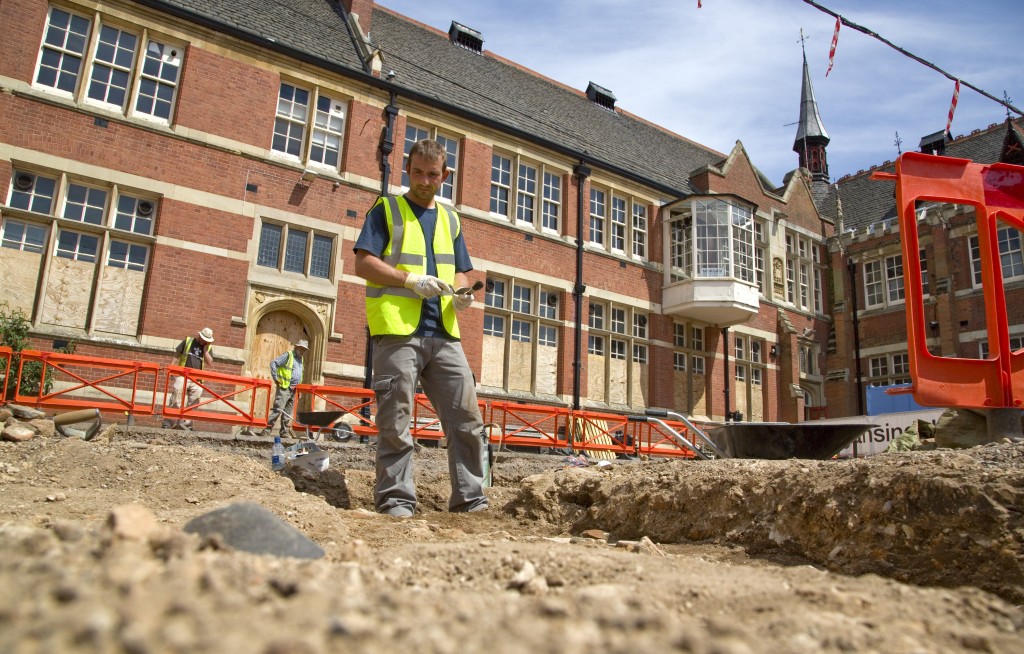
Peter Warzynski, Leicester Mercury – at the digging site where King Richard III was found. 7/2013 (Source: Peter Warzynski)
Your trench 4 looks rather level and not very deep, compared to some other trenches. Was this because of the richness of tiles already preserved in this upper soil section or did you later go deeper as well in a presumption that the area might have been filled in with debris from the destroyed monastery?
That was the top of the trench. Once the tiles had been catalogued and photographed we smashed right through them and continued deeper down. I was a bit taken aback by this. I thought we should be preserving them and removing them from the ground for storage.
However, it was explained to me that if the archaeologists did that with everything they found, especially the hundreds of broken tiles, they would soon run out of room to store them. They told me that the only way of finding out what was buried below their feet was to dig down, record what they had found and keep going. Much of the archaeology they came across was unceremoniously hacked through once it had been recorded.
This is the way it has always been, ever since the first archaeologist picked up a mattock.
Your trench looks very close to the grave of King Richard III. Can you tell us more about the placement of this section in the presumed church layout?
What area did you reveal in comparison to the location of where the grave of King Richard III was situated? Had you hoped to find something with significance to King Richard III in the church?
The site that was being excavated was the choir of the church. A place where only the friars could go.
It was reserved for high status burials and the team actually uncovered – but did not exhume – a number of other remains during both digs.
It faces east to west, as is the tradition with churches, and included a presbytery – where the stone coffin was unearthed. To the north was the friary’s graveyard, which extends under the neighbouring building and the road which separates the site from the Cathedral (where Richard will be reinterred next year).
The second dig was not aimed at finding anything else directly related to Richard III. Historical records say that Henry paid for an alabaster tomb for Richard, but that was never found. It would have been interesting that had been uncovered.
The second dig was aimed at finding out more about the friary itself.
Might King Richard III have been able to make archaeology more popular?
Will superficial observers now, after King Richard III was found so quickly, think archaeology is a fast method? What impression did you get?
The way Richard III was found is certainly not common in archaeology. Archaeologists do not look for specific people – that is very rare. What archaeologists do is dig and see what they find. To go out with the specific intention of finding a particular person is almost unheard of, which is what makes this story even more fascinating.
So, with that in mind, this project might give people the wrong impression about archaeology.
The discovery has also kick started media speculation about other English kings and their presumed whereabouts, and there have been stories in the newspapers about searching for Alfred the Great.
I suppose people might think that archaeology is fast and easy after following Richard’s story. After all the team found him on the morning of the first day of the dig, in the first place they looked, in the first trench that they dug.
Will you attend the burial ceremony of King Richard III next year? What are you looking forward to most? What aspect of the ceremony do you think especially reflects on the person of King Richard III? What aspects do you think – as far as they are known so far – are more to appease contemporary sensibilities rather than King Richard III?
I will definitely be at the reinterment ceremony next year to report on the event, speaking to visitors from far-flung lands and enjoying the occasion for myself. I can’t wait. I’m also working with the cathedral on the plans at the minute, and I’ve been sworn to secrecy regarding the details of the service. Although, they haven’t really told me that much – I think they are still quite distrustful of the press.
The cathedral is not used to this kind of media attention (unlike the university and the city council) and I think it feels slightly uncomfortable.
Despite the judicial review into the exhumation licence, I still think Leicester will be the location of the reinterment. So I’m not worried about York snatching the bones from under our nose.
They could be famous last words, but common sense, and the law is on Leicester’s side. The spurious claims of the Plantagenet Alliance – that they are in some way related to the king – will be shot down within seconds. Richard III has millions of relatives in the UK, with an equal right to the remains.
The fact is, after 500-years, almost everyone in England who can trace their family tree back to the 15th century will find some link to Richard.
This is why the High Court judge, Mr Justice Haddon-Cave, has agreed to hear the case, because he says the country should decide. But then by allowing the debate he’s giving priority to what will only amount to an argument, rather than to the law – which the University of Leicester followed to the letter when they applied for the exhumation licence.
Whom would you invite to attend the burial ceremony, if invitations were left in your hands?
I do think there should be a member of the Royal Family there.
What is your impression of King Richard III now, after all your experiences and your intense occupation with the research? What is your impression now, in comparison with what it was before the search in Leicester even begun?
There has been a lot written about how he has been misrepresented throughout history. I think the argument that he wasn’t as bad as people say does have its merits, but I still think he would have behaved like a monarch of the time – and that means he may not have been a complete angel either.
But whatever kind of king he was, he was buried in Leicester… and Leicester is where he should stay.
♛
Now I am certain you see, why I had such a hard time to stop myself from asking questions from my interview partners.
I hope you enjoyed both interviews with Peter Warzynski and yesterday’s with author Matthew Lewis.
More articles and interviews will follow in the next days.
Don’t forget to take part in the Quiz till the 27th at midnight to have a chance to win!
(Though it starts with questions about actor Richard Armitage, most questions are about King Richard III !
So it is not only for RA-experts, but for history buffs as well!)
Links: King Richard Week 2013 & Quiz

